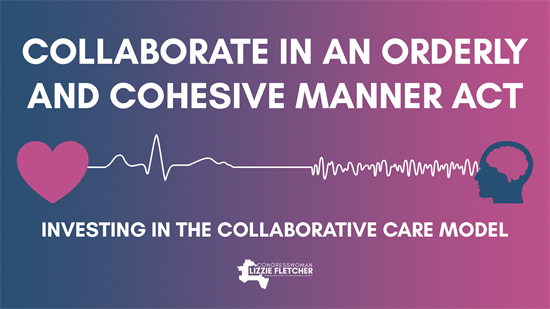Today, Congresswoman Fletcher participated in the Energy and Commerce Committee’s Health Subcommittee hearing entitled Communities in Need: Legislation to Support Mental Health and Well-Being, to highlight mental health legislation, including Congresswoman Fletcher’s bipartisan bill, the Collaborate in an Orderly and Cohesive Manner (COCM) Act, H.R. 5218.
“Our mental health is as vital to our well-being as our physical health, and it is critical that we improve mental health care access for those who need it,” said Congresswoman Lizzie Fletcher. “My bill, the Collaborate in an Orderly and Cohesive Manner Act invests in an evidence-based model that integrates behavioral health into the primary care setting to ensure Americans can access the mental health care they need when they need it. I am grateful to Chairwoman Eshoo for prioritizing mental health legislation by holding today’s hearing and to the witnesses who testified today and shared their expertise. Together, we can make smart investments to improve our country’s mental health system, and provide the tools and resources needed to better identify and treat mental health disorders.”
Congresswoman Fletcher introduced the Collaborate in an Orderly and Cohesive Manner Act last year after more than 90 published trials showed the Collaborative Care Model improves patient outcomes, lowers total costs of care, and reduces stigma related to mental health.
Specifically, the COCM Act would:
- Create a new grant program for primary care practices to implement the CoCM: Many primary care practices operate on thin financial margins with limited support staff, making implementing a new delivery model difficult. Implementing the CoCM in a private practice often requires up front expenses and financial risk that can alienate smaller, rural, and independent practices. The COCM Act authorizes a $30 million per year grant program from Fiscal Years 2022 through 2026 to invest in the CoCM or, a combined approach of the collaborative care model and primary care behavioral health integration models. The program would:
- Provide grants to primary care physicians and practices that can be used to hire necessary staff, formalize relationships with other team members, and purchase or upgrade software and resources needed to implement collaborative care;
- Give preference to physicians and practices with the least existing capacity to implement collaborative care; and
- Prioritize physicians and practices who serve medically underserved populations.
- Establish national and regional Collaborative Care Technical Assistance Centers to assist practices with direct implementation of integrated care models: Many primary care physicians are unsure of how to appropriately implement the Collaborative Care Model, but national and regional organizations are well equipped to provide technical assistance to aid in implementation. This legislation would provide grants to establish national and regional Technical Assistance Centers to help primary care practices implement the model in their practices. The Technical Assistance centers would help do the following:
- Develop staffing models for essential staff roles;
- Provide information technology expertise to help with patient registries, electronic health records, ongoing monitoring, and other IT purposes;
- Provide operational consultation to develop practice workflows;
- Develop financial models for program launch and sustainability;
- Provide guidance on developing and maintaining relationships with community-based mental health and substance use disorder facilities for referral and treatment of patients that may be best served in those settings; and
- Share best practices and lessons learned.
- Expand research on promising integrated care models: While the Collaborative Care Model has by far the most evidence-based research supporting its use among all integrated care, other models have shown promise and more research is needed to identify the best models. These integration models represent important efforts to improve the care of behavioral conditions in primary care and have added value by supporting primary care practitioners.

